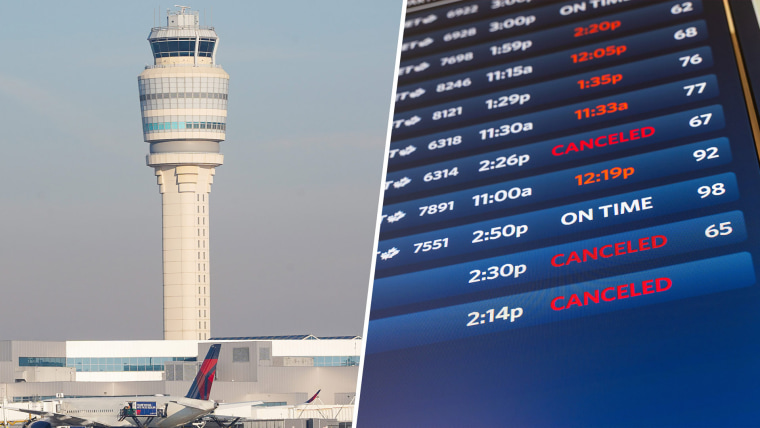Transportation Secretary Sean Duffy on Tuesday urged Congress to quickly pass the bipartisan bill that would end the government shutdown and the flight disruptions that have plagued the country for nearly a week.
"If the House does its work tomorrow, we're well on our way" to getting air travel back to normal, Duffy said during a news conference at Chicago O'Hare International Airport.
But if lawmakers don't act fast, Duffy warned that the disruptions are likely to get worse ahead of Thanksgiving week, one of the busiest travel times of the year.
"This is the Super Bowl of air traffic controlling," Duffy said.
Some airlines, Duffy warned, are already talking about "grounding their planes" if the government doesn't reopen soon.
Duffy spoke on the same day the major airlines cancelled 6% of their flights at 40 high-traffic airports to comply with the Federal Aviation Administration mandate.
The FAA ordered the reduction despite the Senate passing a preliminary agreement to end the government shutdown and moving the bill to the House for approval.
As of Tuesday afternoon, more than 1,200 flights within the U.S. had been canceled, according to the flight tracking website FlightAware, and more than 2,000 flights had been delayed.
United Airlines posted a list of its canceled flights for Tuesday and Wednesday. The lengthy list covers flights all day and across the entire country.
The airports hit with the most cancellations are in major cities such as Chicago, the New York area, Washington, D.C., Atlanta and Dallas-Fort Worth.
It remained to be seen how many of the delays and cancellations were attributable to two straight days of record cold weather that spread across the eastern two-thirds of the country.
Lake-effect snow that began Monday in the Midwest continued into Tuesday in the Northeast, where an additional 4 to 8 inches of snow was possible in some areas.
Down south, some 66 million people from southeast Virginia to the Gulf Coast shivered through a second straight day of unseasonable cold with temperatures dipping into the 20s and 30s in some places.
The FAA began reducing the number of flights landing and departing from major airports by 4 % on Friday because of a shortage of air traffic controllers and Transportation Security Administration employees, both of which have been working 42 days without pay as of Tuesday.
Barring a last-minute change, the flight reduction is supposed to increase to 8% on Thursday and to 10% by Friday, the FAA said.
That plan was hatched before eight Democratic senators broke with their party late Monday to pass a bipartisan bill that would end the longest-ever government shutdown.
It still needs to be passed by the House and then signed by President Donald Trump — who has indicated he supports it — for the government to return to full functionality.
In a Truth Social post on Monday, Trump called out controllers he said were skipping work and suggested a $10,000 bonus for those who worked through the shutdown — even though he admitted he didn’t know where the money would come from.
Duffy called Trump's proposal "brilliant."
"They should get a bonus," he said. "The should go to the White House and get a check."
As for the controllers who missed days, Duffy they will "take action" but gave no specifics.
"I'm concerned about their patriotism," Duffy said.
Air traffic controllers are considered essential workers and are not allowed to walk off the job, even if they're not getting paid.
A 2018 law ensures that controllers who work during a government shutdown receive back pay.
Still, as the shutdown that began on Oct. 1 dragged on, airports reported a steady increase in the number of call-outs by controllers.
Meanwhile, the airlines struggled to get frustrated travelers to their destinations.
Earlier, Duffy reminded the airlines that it is their responsibility to refund travelers whose purchased flights canceled due to the FAA mandate. He also said that the "stringent requirements" that typically apply to getting refunds have been removed.
Even if the shutdown ends later this week, Duffy said it could take much longer for the flight system to right itself and for flight schedules to return to 100%.
More than 2,400 U.S. flights were canceled Monday, with only 4% canceled as mandated by the FAA. More than 5 million air travelers have been affected by flight delays because airports lacked enough controllers to handle all the traffic, the FAA reported.
Only 11 flights were canceled from Oct. 1 to Oct. 29 due to the same staffing issues, but the number of cancellations jumped to 4,162 from Oct. 30 to Nov. 9.
The vast majority of those cancellations — 3,756 — occurred from Nov. 7 to Nov. 9, when the FAA began mandating flight reductions at the 40 high-traffic airports.
Nick Daniels, president of the National Air Traffic Controllers Association, said the flight reductions had to be done because the strain on controllers puts the public at greater risk.
“This is the erosion of the safety margin the public never sees, but America relies on every single day,” Daniels said at a news conference.


